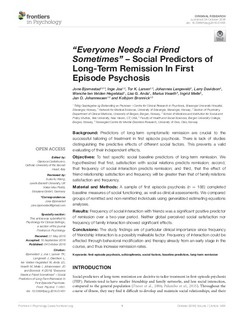"Everyone Needs a Friend Sometimes" - social predictors of long-term remission in first episode psychosis
Bjørnestad, Jone Ravndal; Joa, Inge; Larsen, Tor Ketil; Langeveld, Johannes H.; Davidson, Larry; Hegelstad, Wenche; Anda-Ågotnes, Liss Gøril; Veseth, Marius; Melle, Ingrid; Johannessen, Jan Olav; Brønnick, Kolbjørn Selvåg
Journal article, Peer reviewed
Published version
Permanent lenke
http://hdl.handle.net/11250/2442648Utgivelsesdato
2016-10Metadata
Vis full innførselSamlinger
Originalversjon
Bjørnestad, J.R. et al. (2016) "Everyone Needs a Friend Sometimes" - social predictors of long-term remission in first episode psychosis. Frontiers in Psychology, 7 10.3389/fpsyg.2016.01491Sammendrag
Background: Predictors of long-term symptomatic remission are crucial to the successful tailoring of treatment in first episode psychosis. There is lack of studies distinguishing the predictive effects of different social factors. This prevents a valid evaluating of their independent effects.
Objectives: To test specific social baseline predictors of long-term remission. We hypothesized that first, satisfaction with social relations predicts remission; second, that frequency of social interaction predicts remission; and third, that the effect of friend relationship satisfaction and frequency will be greater than that of family relations satisfaction and frequency.
Material and Methods: A sample of first episode psychosis (n D 186) completed baseline measures of social functioning, as well as clinical assessments. We compared groups of remitted and non-remitted individuals using generalized estimating equations analyses.
Results: Frequency of social interaction with friends was a significant positive predictor of remission over a two-year period. Neither global perceived social satisfaction nor frequency of family interaction showed significant effects.
Conclusions: The study findings are of particular clinical importance since frequency of friendship interaction is a possibly malleable factor. Frequency of interaction could be affected through behavioral modification and therapy already from an early stage in the course, and thus increase remission rates.

